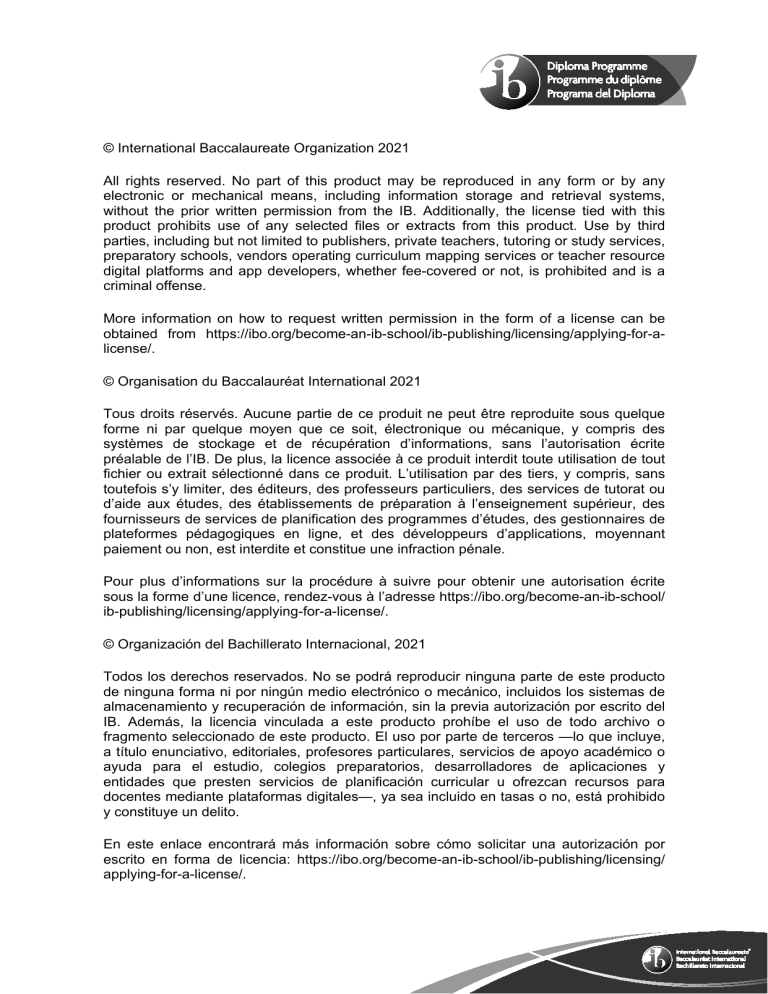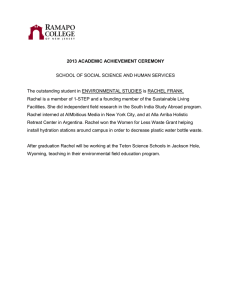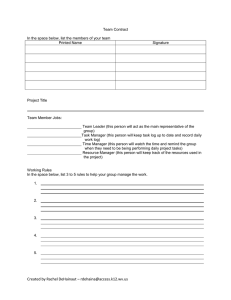
© International Baccalaureate Organization 2021 All rights reserved. No part of this product may be reproduced in any form or by any electronic or mechanical means, including information storage and retrieval systems, without the prior written permission from the IB. Additionally, the license tied with this product prohibits use of any selected files or extracts from this product. Use by third parties, including but not limited to publishers, private teachers, tutoring or study services, preparatory schools, vendors operating curriculum mapping services or teacher resource digital platforms and app developers, whether fee-covered or not, is prohibited and is a criminal offense. More information on how to request written permission in the form of a license can be obtained from https://ibo.org/become-an-ib-school/ib-publishing/licensing/applying-for-alicense/. © Organisation du Baccalauréat International 2021 Tous droits réservés. Aucune partie de ce produit ne peut être reproduite sous quelque forme ni par quelque moyen que ce soit, électronique ou mécanique, y compris des systèmes de stockage et de récupération d’informations, sans l’autorisation écrite préalable de l’IB. De plus, la licence associée à ce produit interdit toute utilisation de tout fichier ou extrait sélectionné dans ce produit. L’utilisation par des tiers, y compris, sans toutefois s’y limiter, des éditeurs, des professeurs particuliers, des services de tutorat ou d’aide aux études, des établissements de préparation à l’enseignement supérieur, des fournisseurs de services de planification des programmes d’études, des gestionnaires de plateformes pédagogiques en ligne, et des développeurs d’applications, moyennant paiement ou non, est interdite et constitue une infraction pénale. Pour plus d’informations sur la procédure à suivre pour obtenir une autorisation écrite sous la forme d’une licence, rendez-vous à l’adresse https://ibo.org/become-an-ib-school/ ib-publishing/licensing/applying-for-a-license/. © Organización del Bachillerato Internacional, 2021 Todos los derechos reservados. No se podrá reproducir ninguna parte de este producto de ninguna forma ni por ningún medio electrónico o mecánico, incluidos los sistemas de almacenamiento y recuperación de información, sin la previa autorización por escrito del IB. Además, la licencia vinculada a este producto prohíbe el uso de todo archivo o fragmento seleccionado de este producto. El uso por parte de terceros —lo que incluye, a título enunciativo, editoriales, profesores particulares, servicios de apoyo académico o ayuda para el estudio, colegios preparatorios, desarrolladores de aplicaciones y entidades que presten servicios de planificación curricular u ofrezcan recursos para docentes mediante plataformas digitales—, ya sea incluido en tasas o no, está prohibido y constituye un delito. En este enlace encontrará más información sobre cómo solicitar una autorización por escrito en forma de licencia: https://ibo.org/become-an-ib-school/ib-publishing/licensing/ applying-for-a-license/. Business management Case study: Multi Marketing For use in May 2021 Instructions to candidates y Case study booklet required for higher level paper 1 and standard level paper 1 business management examinations. 5 pages 2221 – 5001 © International Baccalaureate Organization 2021 –2– 2221 – 5001 Multi Marketing (MM) 5 10 15 20 25 30 Rachel Goldstein, Javed Khan and Aarvan Anand met at university in London, United Kingdom, in 2010. They all grew up in different countries – Rachel in Israel, Javed in Jordan, and Aarvan in India. They also studied different things at university: Rachel studied graphic design, Javed studied business and Aarvan studied media and journalism. All had previously completed IB Diploma courses at their respective schools. During their studies, Rachel, Javed and Aarvan worked together on the university’s student magazine. Javed was responsible for managing the advertisements that appeared in the magazine, and his role included finding new advertisers, negotiating prices and getting the advertisements from design to print. Rachel used her graphic design skills to design and set each edition of the magazine. Aarvan used his talent for journalism to find stories and produce the news content of the magazine. They all enjoyed working as a team so much that they decided to set up a marketing business together when they graduated, which would allow them to each use their respective talents. In 2013, the three of them set up Multi Marketing (MM) as a partnership. The company provided marketing services, which involved helping businesses reach customers through improving corporate branding and creating marketing strategies. MM ’s start-up was financed mainly by loans from parents and friends as well as by crowdfunding1 on social media. It was originally based in London, which has many benefits as a world centre for media and creative activities and easy access to many large national and international businesses, particularly in European markets. Initially, MM advised customers on all issues relating to marketing and designed marketing strategies for them. It then outsourced the production work, which included making advertising campaigns, and managed and coordinated the various businesses involved. In its first year of operation, all of MM ’s customers were businesses located near the university or those that had connections with the university. Soon, however, MM had customers throughout the United Kingdom. The business grew rapidly over the next four years. Its growth was based on its innovative use of social media and other technologies, the youthful enthusiasm of its owners, its rapid response to customers and the strong word-of-mouth promotion from customers. In 2017, the partners (Rachel, Javed and Aarvan) converted MM to a private limited company. They became the majority shareholders, each owning a quarter of the shares, with the remaining quarter owned by their families. Rachel was appointed Managing Director and remains in that position. MM ’s organizational chart is shown in Figure 1. –3– 2221 – 5001 Figure 1: MM ’s organizational chart Managing Director (Rachel) Javed Design Division 35 40 45 50 Finance Division Aarvan Digital Operations Division Marketing Division Sales Division Rachel is fairly cautious in her approach. Although she favours expansion, she wants to minimize risks. Aarvan is much more enthusiastic about expansion. He thinks that risks have to be taken to gain rewards. Today, MM has both national and multinational businesses as customers. Unusually, it also has charities, non-governmental organizations (NGOs) and government departments as customers. The company now employs 50 people. MM focuses on those areas of business in which its owners have strong skills and outsources some of the other functions. Today, its services include: y advising on advertising media and designing appropriate material for the chosen media y developing marketing strategies, including the use of changing technologies like social media and other promotional methods and e-commerce websites y designing specifications for film and radio promotions, including creating storylines y advising on potential product improvements y buying advertising space for clients on the internet, radio and TV y advising customers on pricing strategies y recommending distribution channels where appropriate. Some of the services that MM outsources include: y photography used in marketing materials, such as advertisements y production of film and radio promotions y human resource management (HRM) for MM and its employees. 55 60 65 MM has strong ethical objectives, including in its choice of customers. For example, the company will not accept business from organizations that do not have robust equal opportunities policies or those that do not actively work to reduce their carbon footprint. It will also not work with businesses that subcontract to other businesses that exploit employees, such as by paying lower-than-local-average wages, and it considers it important that the organizations with which it works value freedom of expression. The owners of MM try to reflect their own cultural diversity in everything the business does, such as having multicultural content in the marketing strategies it creates. This approach is liked by many of MM ’s customers. As well as these ethical objectives, MM reflects the youthful enthusiasm of its owners. Through hard work and commitment, the company also aims to respond to customers more quickly than others in the industry, with customer service being at the centre of everything it does. Turn over –4– 70 75 80 2221 – 5001 Partly because of political events in the United Kingdom in 2016, the owners decided to open an office in Bengaluru2, the IT capital of India. One of the fastest growing countries in recent years, and one that Aarvan is familiar with, India provides many opportunities for growth and maintaining contact with existing customers. So far, the Bengaluru branch of MM has sales, design and customer care teams serving Asia. There is now the possibility of relocating more of the business to India in 2022. Rachel thinks that the opening of the Bengaluru office has provided her with the opportunity for a major reorganization of MM. Currently, the Sales Division, headed by Aarvan, is still based in London. It is organized by type of customer, which means that it has four separate departments: y The Corporate Department, which manages the contracts with business customers. y The Public Service Department, which manages contracts with government departments and NGOs. y The Charities Department, which manages contracts with charities. y The International Department, which coordinates all of MM ’s activities. Rachel has proposed that the Sales Division should now be organized by country of sale. The Indian office has been successful so far. Excellent premises were found in Bengaluru. Some of MM ’s London employees moved to India, with the remainder being recruited locally. Recruitment of highly qualified employees was difficult, however, so MM had to attract these new workers with high salaries and generous benefits. 85 Now, in 2021, Rachel, as Managing Director, has some problems to solve. The HRM problem 90 95 100 The manager of the Public Service Department is Clare, a highly successful marketing manager recruited from New Zealand. Her drive and enthusiasm inspired some in her team, which has resulted in a 50 % increase in revenue by the department over the last 12 months. Customer satisfaction is very high, and some of the marketing strategies designed by Clare’s team have won awards. Clare consults and delegates but is prepared, where necessary, to be autocratic, particularly when there are targets to be met. Clare is ambitious and has a very strong interest in environmental issues. When the government of an Indian state employed MM to design and implement an advertising campaign to encourage people to use less plastic, Clare wanted the campaign to be bigger and better than any other and to be completed as quickly as possible. Staff in her department complained about unrealistic deadlines and bullying from Clare. When Clare found out about their complaints, she was rude to them, blocked their pay rises and threatened them with less interesting work. These employees have asked for Clare to be dismissed for harassment. Aarvan, Clare’s manager, has organized a meeting with Rachel to decide Clare’s future. The finance problem 105 110 Javed and Rachel met to discuss the newest provisional accounts and cash flow forecasts for 2021. They expected that the opening of an Indian branch of the company would reduce its profits for a year. However, if the costs of operating the branch turned out to be higher than planned, or sufficient revenues were not achieved, it would take longer to recover target levels of profit. They found that, although profits for 2020 were high compared with previous years due to some new contracts, there were signs of increasing costs. Javed thinks that MM needs to reduce its costs. He has suggested that they: y delay a planned pay rise for employees y reduce the high payments made to the owners y reduce expenditure on marketing MM ’s services. Rachel does not want to reduce spending in areas that might result in reducing MM ’s ability to generate revenue. Instead, she thinks that MM should explore suitable sources of finance. –5– 2221 – 5001 The ethical problem 115 120 Clare has been approached by a government in a nearby country (Country X) to design marketing in order to improve the image of the country. This contract would open up a new market for MM, so Clare thinks it is an opportunity that cannot be missed. The contract would be very profitable to MM and the country has offered a good price for the work. However, several people at MM have told Rachel that they think this contract is inconsistent with MM ’s ethical objectives: the country has been accused of human rights abuses, including arresting journalists for criticizing the government and persecuting people for their religious beliefs. It also has high levels of poverty and a poor environmental record, which the government has been accused of doing little to solve. The location problem 125 The Bengaluru office is responsible for customers in Asia. In 2021, this region will account for 30 % of MM ’s business, but it is expected to account for 60 % by 2025. Today, the Bengaluru office includes divisions responsible for sales, commissioning the work required to provide customers with the product, and providing after-sales service. Other business functions, including the rest of the Sales Division, either remain in the United Kingdom or are outsourced. 130 Rachel would like to move all of MM ’s operations to Bengaluru. Bengaluru is a rapidly growing city of over 8 million people. Some aspects of its infrastructure, such as roads and water, have struggled to keep up with the growth. Deteriorating air quality, mainly from traffic pollution, is also a significant problem. Bengaluru is known as the “Silicon Valley of India”, with a concentration of high-tech businesses. These businesses benefit from high-quality education and training facilities. Bengaluru is also home to its own film industry, which produces about 80 films each year. The rapid growth of Bengaluru means extensive construction of buildings, and Rachel believes that suitable premises could be found at lower rents than in the UK. 135 140 Javed can see operational difficulties with moving some of the design functions of MM to Bengaluru. Although the country has a strong IT industry, London has a stronger creative industry. Many of the creative employees at MM, like its graphic designers and artists, are based in London and are unlikely to want to relocate to India. Many recent recruits to MM have also come from the London Academy of Creative Arts. The future 145 150 The owners of MM are exploring the possibility of taking over Satvi Films (SF), a film studio in India, so that the company can produce its own advertisements for radio, TV and cinema without having to outsource the work. MM would need $100 million to pay for the film studio, which is approximately two years of net profits. There is evidence that economic activity in the major economies of the world is slowing down. Many businesses reduce their marketing spending in a recession, but the owners of MM are convinced that this is actually the right time for businesses to increase their marketing activity. All MM needs to do is convey this message to its customers… 1 crowdfunding: a way of raising finance by asking a large number of people for a small amount of money each. It often takes places online 2 Bengaluru: Bangalore Companies, products, or individuals named in this case study are fictitious and any similarities with actual entities are purely coincidental. References: © International Baccalaureate Organization 2021


